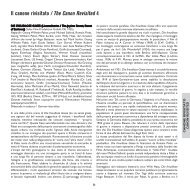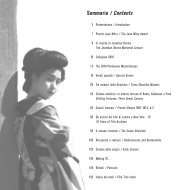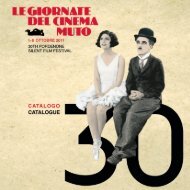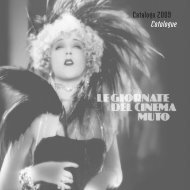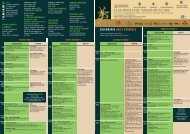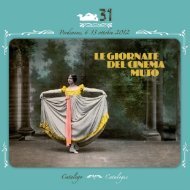Catalogo Giornate del Cinema Muto 2012 - La Cineteca del Friuli
Catalogo Giornate del Cinema Muto 2012 - La Cineteca del Friuli
Catalogo Giornate del Cinema Muto 2012 - La Cineteca del Friuli
Create successful ePaper yourself
Turn your PDF publications into a flip-book with our unique Google optimized e-Paper software.
film apparentemente realizzato a sostegno <strong>del</strong>la British Legion, in cui<br />
comparivano pure il generale Douglas Haig e il principe di Galles (il<br />
futuro duca di Windsor). Il suo promettente esordio cinematografico<br />
risaliva al 1913, e già alla fine <strong>del</strong> 1914 gli venivano affidati ruoli<br />
importanti nei film di Florence Turner; poi la sua filmografia registra<br />
una prevedibile interruzione fino al 1920. Continuò a interpretare<br />
parti di rilievo fino al 1927, dopodiché sembra scomparire nel nulla.<br />
Casualmente, nel suo ultimo ruolo da protagonista – quello <strong>del</strong> “soldato<br />
solitario” di Motherland (1927) – fu diretto da G.B. Samuelson. In A<br />
Couple of Down and Outs fa invece appena la sua seconda apparizione<br />
sullo schermo la <strong>del</strong>iziosa e spumeggiante Edna Best (1900-1974), che<br />
avrebbe avuto una notevole carriera cinematografica e teatrale sia<br />
in Inghilterra sia negli Stati Uniti. Dal 1912 al 1930 George Foley (il<br />
poliziotto padre di Edna) lavorò in molti film inglesi, specializzandosi<br />
in ruoli comici e fungendo regolarmente da spalla nelle commedie di<br />
Walter Forde. Come fa notare Kevin Brownlow, un ruolo importante<br />
nel film ce l’ha anche l’East End londinese: “Sembra tutto così fresco.<br />
In gran parte è stato raso al suolo nel settembre <strong>del</strong> 1940. Assomiglia<br />
alla Londra di Charlie Chaplin ricostruita a Hollywood – specialmente<br />
con i poliziotti che corrono su e giù!” – DAVID ROBINSON<br />
London’s memorial to Animals in War carries a simple inscription:<br />
“They had no choice.” On all sides, 8 million horses are estimated to<br />
have died during the First World War. When the war broke out, the<br />
cavalry was still supreme, but was almost instantly rendered archaic<br />
by the new horrors of trench warfare and the machine gun. In a last<br />
cavalry charge rashly launched by the British in March 1918, all but 4 of<br />
the 150 horses were cut down by the German machine guns.<br />
The new and vital role of the horse in the First World War was<br />
as the most reliable form of transport to the front line. There are<br />
innumerable records of the close and often sentimental comradeship<br />
that grew between men and animals at the front. A Couple of Down<br />
and Outs recalls this kinship, but also the widespread indignation at the<br />
fate of the equine heroes after the war, sold off fast and cheap, many<br />
exported to Belgium as human food. (The universal British aversion<br />
to horsemeat undoubtedly has its roots in the nation’s sentimental<br />
attachment to the animal.)<br />
Down-and-out and unemployed ex-soldier Danny Creath (Rex Davis)<br />
recognizes his old artillery horse being loaded for shipping to the<br />
continental knackers’ yard. He has no alternative but to steal him, and<br />
the two go on the run, with the support of a friendly girl with a stable,<br />
and her policeman father, ready to turn a blind eye. These three humans<br />
and the horse (played by two different animals) are virtually the only<br />
characters in the film, though the flashbacks to the Western Front have<br />
an impressive reality which clearly marks the film out as the first work<br />
of the British screen’s war poet, Walter Summers (1896-1973). Born<br />
into a family of actors, at 17 Summers entered films as an assistant to<br />
George Loane Tucker, who was working in Britain at the start of the<br />
war. He joined the army at 18 and served throughout the conflict. His<br />
service career was distinguished: he rose to the rank of captain and<br />
146<br />
was awarded the Military Cross and the Distinguished Service Medal.<br />
We know little of his war experiences but their mark is evident on his<br />
silent films. After demobilization he worked briefly for Hepworth and<br />
in India, before being hired as a writer by G.B. Samuelson, with whom<br />
he also co-directed Afterglow (1923). Finally Samuelson gave him his<br />
chance to direct solo, and the result was A Couple of Down and Outs.<br />
He went on to direct three more films for Samuelson’s Napoleon films<br />
in 1924 – Who Is the Man?, The Cost of Beauty, and The Unwanted,<br />
which is also showing in this year’s <strong>Giornate</strong>.<br />
Moving on to British Instructional Films he made the extraordinary<br />
series of war reconstructions for which he is now best remembered:<br />
Ypres (1925), Mons (1926), Nelson (1926), The Battles of the Coronel<br />
and Falkland Islands (1927, reissued with sound in 1932 as The Deeds<br />
Men Do), and Bolibar (1928). His last silent film was the first version of<br />
The Lost Patrol (1929), to be remade by John Ford in 1934. Summers’s<br />
career continued successfully into the sound period, though few of his<br />
heterogeneous films are remembered except for his return to the<br />
trenches with Suspense (1930), and one of his last films, The Dark<br />
Eyes of London (1939, with Bela Lugosi). With the outbreak of the<br />
Second World War the 43-year-old Summers dutifully re-enlisted in<br />
the army. He was never to make another film.<br />
It is inevitable but not relevant to link A Couple of Down and Outs<br />
with Steven Spielberg’s recent film adaptation of Michael Morpurgo’s<br />
novel and play War Horse. Kevin Brownlow recalls that he showed the<br />
Summers film to Morpurgo, who was so excited by it that a screening<br />
was arranged for Spielberg’s writer – who did not however turn up.<br />
War Horse is a nostalgic recreation of the sentiment of another age.<br />
A Couple of Down and Outs was made when the memories were still<br />
bitterly fresh.<br />
We know little about the main actor, Rex Davis, except that he was<br />
born in 1890; but it is clear that he served through the war, and indeed<br />
his last film appearance was as himself in Remembrance (1928), a film<br />
apparently made in aid of the British Legion, in which Earl Haig and the<br />
Prince of Wales (later Duke of Windsor) also appeared. His career<br />
had begun promisingly in 1913, and he had progressed to be a leading<br />
player in Florence Turner films by late 1914, after which there is the<br />
predictable break in his filmography until 1920. He continued to get<br />
good roles until 1927, after which he entirely disappeared from view.<br />
By chance, in his last main role – as the Lonely Soldier in Motherland<br />
(1927) – he was directed by G.B. Samuelson. This was only the second<br />
film role of the spunky and charming Edna Best (1900-1974), who<br />
went on to a distinguished theatre and film career both in Britain<br />
and the United States. George Foley, who plays her policeman father,<br />
was a busy screen actor from 1912 to 1930, specializing in comedy,<br />
and a regular foil to the star in Walter Forde comedies. As Kevin<br />
Brownlow has pointed out, the background of London’s East End also<br />
has a starring role: “It seems so very fresh. So much of it was flattened<br />
in September 1940. It looks like Chaplin’s London as he recreated it in<br />
Hollywood – especially with the policemen running through it!”<br />
DAVID ROBINSON<br />
The Steinhoff Project<br />
FAMILIENTAG IM HAUSE PRELLSTEIN [Riunione di famiglia in casa<br />
Prellstein / Family Reunion in the House of Prellstein] (Herrnfeld-Film/<br />
Rex-Film, per/for Ufa, DE 1927)<br />
Regia/dir: Hans Steinhoff; prod: Lupu Pick; scen: Viktor Klein,<br />
dalla pièce di/based on the play by Anton & Donath Herrnfeld; f./<br />
ph: Curt Courant; scg./des: Leo Wiltlin; cast: Szöke Szakall (Sami<br />
Bambus), Erika Gläßner (Flora Bambus, née Birnbaum), Siegfried<br />
Arno (Prellstein), Paul Morgan (David Freundlich), Anton Herrnfeld<br />
(Jaromir Schestak), Karl Ettlinger (Moritz Igel), Fritz Spira (Salomon<br />
Stern), Ilka Grüning (Seraphine), Max Ehrlich (Nurmi, cameriere/<br />
waiter at Café International), Henry Bender (giocatore di carte/card<br />
player at Café International), Paul Rehkopf (fattorino/telegram boy),<br />
Oskar Sima, Ludwig Stössel (parenti in lutto/mourning relations);<br />
première: 16.12.1927, Ufa-Theater Königstadt, Berlin; orig. l: 2040 m.;<br />
35mm, 2010 m., 73' (24 fps); fonte copia/print source: Bundesarchiv-<br />
Filmarchiv, Berlin.<br />
Didascalie in tedesco / German intertitles.<br />
Familientag im Hause Prellstein è liberamente tratto da una commedia<br />
di gran successo <strong>del</strong> 1905-6 di Anton e Donat Herrnfeld, autori,<br />
star e proprietari <strong>del</strong>lo Herrnfeld-Theater, il primo e più importante<br />
teatro berlinese di commedie ebraiche prima <strong>del</strong>la Grande Guerra. Il<br />
film, girato nel febbraio 1927, fa parte dei quickie realizzati dalla Rex-<br />
Film per l’Ufa sotto la supervisione di Lupu Pick, l’illustre produttore<br />
ebreo, noto per il suo impegno sociale. Il soggetto fu probabilmente<br />
scelto in seguito all’affermazione internazionale <strong>del</strong>la pellicola<br />
hollywoodiana prodotta da Sam Goldwyn a partire da una commedia<br />
ebraica che aveva furoreggiato a Broadway, Potash and Perlmutter, e<br />
distribuita in Germania dall’Ufa. Alla fine di marzo, Steinhoff dichiarava<br />
al direttore <strong>del</strong>la rivista di categoria tedesca Lichtbild-Bühne che si<br />
apprestava a “dare ancora un’occhiata prima <strong>del</strong>la prima” al suo “film<br />
ebraico”, prevedendo che questo “<strong>del</strong>izioso lavoro sarebbe stato<br />
favorevolmente accolto dal pubblico e dalla critica, viste le novità che<br />
presentava sia come genere sia sotto l’aspetto formale”. Lo attendeva<br />
però una cocente <strong>del</strong>usione.<br />
Mentre Steinhoff lavorava a Prellstein il consiglio di amministrazione<br />
<strong>del</strong>l’Ufa che aveva commissionato il film venne sostituto da una nuova<br />
dirigenza, controllata dal nuovo proprietario <strong>del</strong>l’azienda, Alfred<br />
Hugenberg, magnate dei media ed esponente politico di destra. Verso<br />
la fine di aprile, in seguito a una revisione dei rapporti tra Ufa e Rex-<br />
Film, il nuovo presidente <strong>del</strong> consiglio di amministrazione comunicò a<br />
Lupu Pick che il film non soddisfaceva “gli standard che ci si aspetta da<br />
prodotti da immettere sul mercato [brauchbare Ware]”. E insistette<br />
per ottenere dalla Rex-Film una riduzione <strong>del</strong> prezzo dato che<br />
ben difficilmente per Prellstein ci sarebbe stato un pubblico. Dopo<br />
reciproche minacce di azioni legali, le parti giunsero infine a un accordo,<br />
che però non pare aver soddisfatto gli “uomini nuovi” <strong>del</strong>l’Ufa: il loro<br />
marketing <strong>del</strong> film dimostra infatti una <strong>del</strong>iberata volontà di farlo<br />
naufragare. Per distribuirlo aspettarono otto mesi. <strong>La</strong> prima non<br />
ebbe luogo in una <strong>del</strong>le prestigiose sale <strong>del</strong>l’Ufa nella zona elegante di<br />
147<br />
Berlino, bensì in un cinema <strong>del</strong> Prenzlauer Berg, un quartiere operaio<br />
inglobato nella città solo pochi anni prima. Il “lancio” avvenne senza<br />
nessuna campagna pubblicitaria (neppure una segnalazione nelle riviste<br />
<strong>del</strong> settore). Non un soldo fu speso per promuovere l’uscita <strong>del</strong> film<br />
in prima visione, per la quale fu scelta la data <strong>del</strong> 16 dicembre – il fine<br />
settimana prima di Natale, quello in cui notoriamente si registrano gli<br />
incassi più bassi <strong>del</strong>l’anno. Per di più, fu quello uno dei giorni più freddi<br />
<strong>del</strong>l’inverno, per cui ben pochi critici si presero la briga di andare in un<br />
remoto cinema di seconda visione per assistere alla prima di un film<br />
a basso costo.<br />
I dirigenti <strong>del</strong>l’Ufa non furono i primi ad avere problemi con Prellstein.<br />
Nel corso di tutti gli anni Dieci, il testo aveva alimentato roventi<br />
polemiche per i toni comici e accentuatamente caricaturali con cui gli<br />
Herrnfeld avevano ritratto la vita ebraica. Le organizzazioni ebraiche<br />
accusavano i due fratelli di aver messo in ridicolo usanze e comunità<br />
ebraiche, fomentando i pregiudizi, mentre gli antisemiti, da parte loro,<br />
proclamavano che le rappresentazioni degli Herrnfeld smascheravano<br />
il “vero” carattere ebraico. Discussioni analoghe imperversarono<br />
quando Steinhoff diresse la versione cinematografica <strong>del</strong>la pièce. <strong>La</strong><br />
rivista tedesca di categoria Kinematograph pubblicò addirittura un<br />
articolo anonimo in cui metteva in dubbio l’opportunità di realizzare il<br />
film. Con tono minaccioso, si faceva notare ai dirigenti ebrei <strong>del</strong>la Rex-<br />
Film che il pubblico tedesco ne sarebbe rimasto offeso e non avrebbe<br />
accettato che altre pellicole impiegassero il linguaggio <strong>del</strong>le opere degli<br />
Herrnfeld. Steinhoff e la Rex-Film anticiparono forse tale obiezione<br />
poiché – con un’eccezione – evitarono accuratamente di ricorrere<br />
al gergo ebraico. Benché il ritmo <strong>del</strong>le didascalie sia in sintonia con<br />
l’ambientazione ebraica <strong>del</strong> film, la storia non riguarda gli ebrei ma il<br />
comportamento umano in generale, vividamente reso dalle splendide<br />
interpretazioni di alcuni dei migliori attori di origine ebraica <strong>del</strong> teatro<br />
leggero tedesco. Difficilmente si può immaginare una qualsiasi riunione<br />
di famiglia che non contenga elementi <strong>del</strong>la storia di Sami Bambus, il<br />
quale simula la propria morte per vendicarsi <strong>del</strong>l’insopportabile moglie<br />
e di Prellstein, cugino di lei e temibile scroccone, lasciando in eredità a<br />
entrambi (nonché all’intero clan dei Prellstein) non una fortuna, bensì<br />
i debiti accumulati giocando a carte. – HORST CLAUS<br />
Familientag im Hause Prellstein is loosely based on a hit comedy<br />
from 1905-06 by Anton and Donat Herrnfeld, the authors, stars, and<br />
owners of the Herrnfeld-Theater, Berlin’s first and foremost pre-<br />
World War I Jewish comedy theatre. The film was made in February<br />
1927 as a quota quickie for Ufa by Rex-Film under the supervision<br />
of the studio’s prominent, socially committed Jewish producer Lupu<br />
Pick. The choice of subject seems to have been prompted by the<br />
international success of Sam Goldwyn’s Hollywood production of the<br />
hit Broadway Jewish comedy Potash and Perlmutter, distributed in<br />
Germany by Ufa. At the end of March, Steinhoff informed the theneditor<br />
of the German trade paper Lichtbild-Bühne that he was about<br />
“to have another look at my Jewish film prior to its premiere” and<br />
expected this “charming picture to be well received by critics and<br />
R & R




